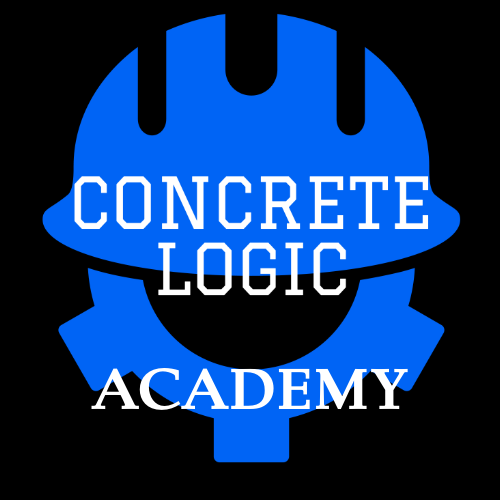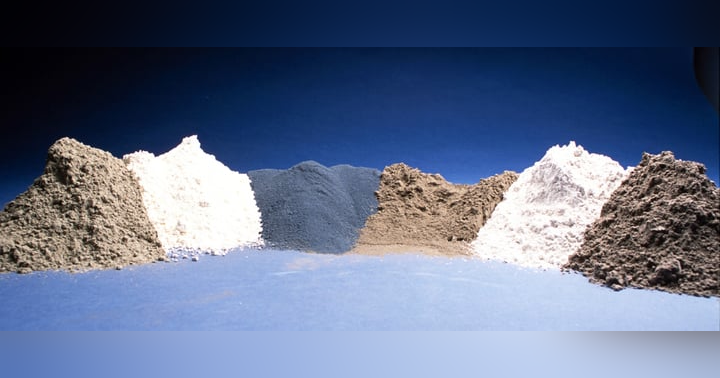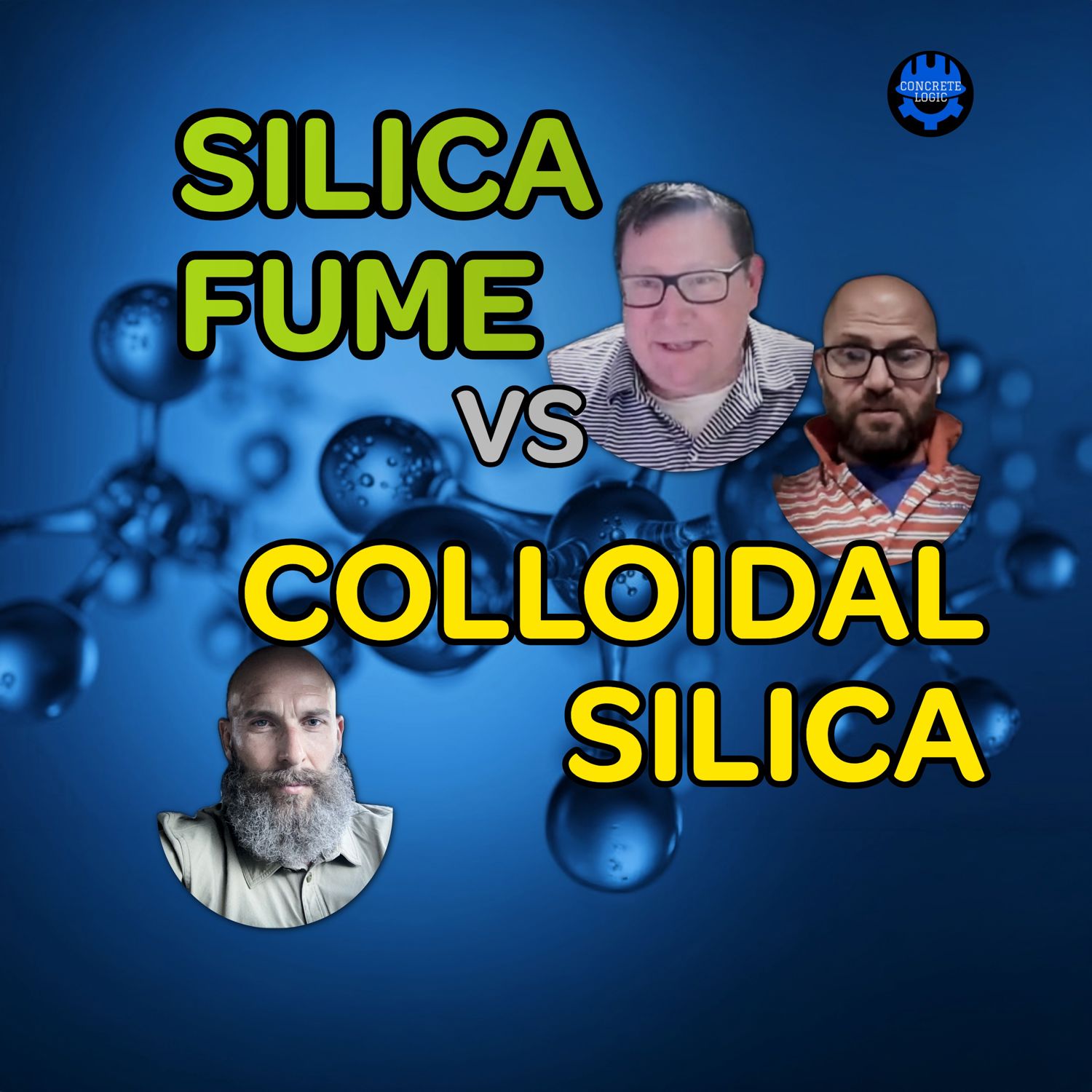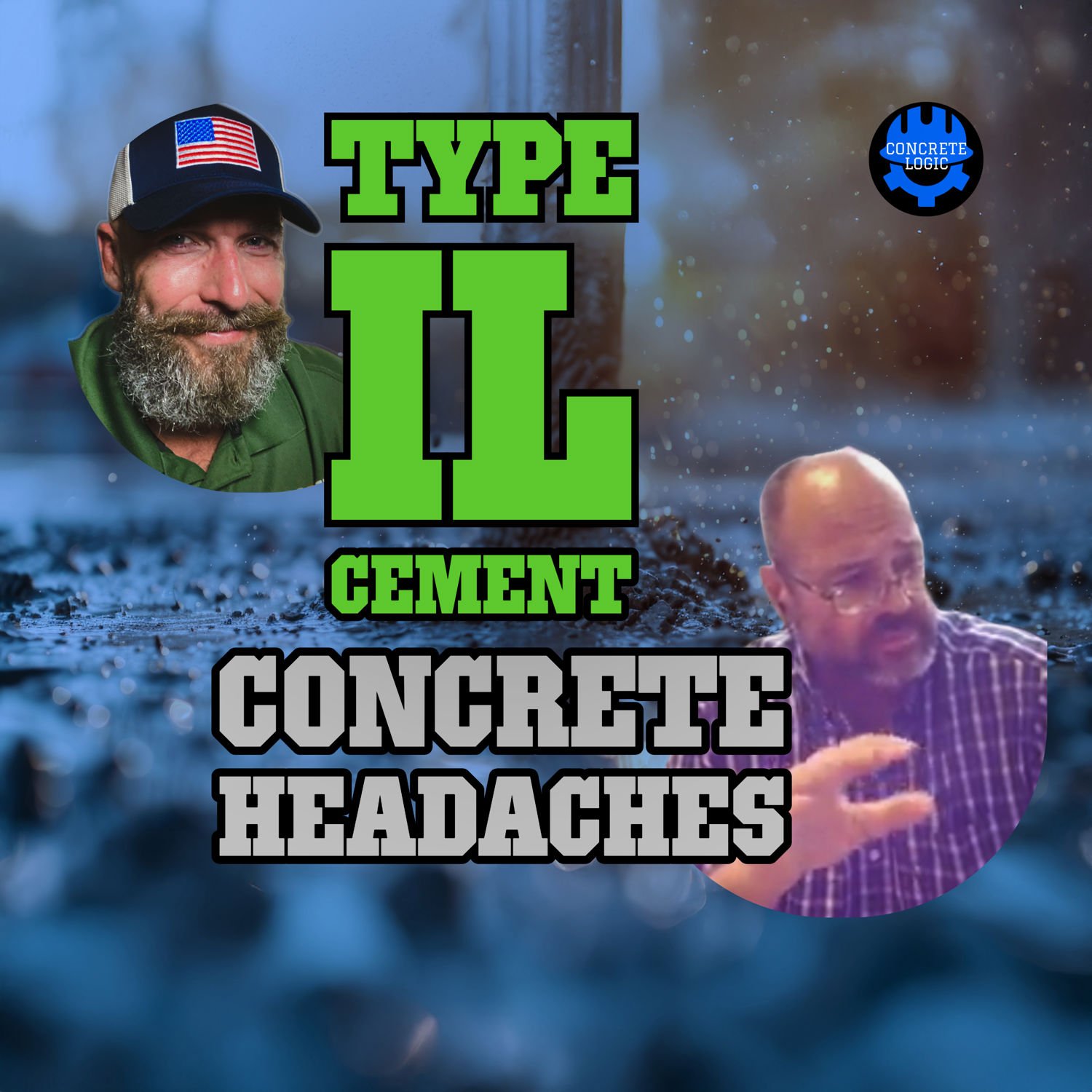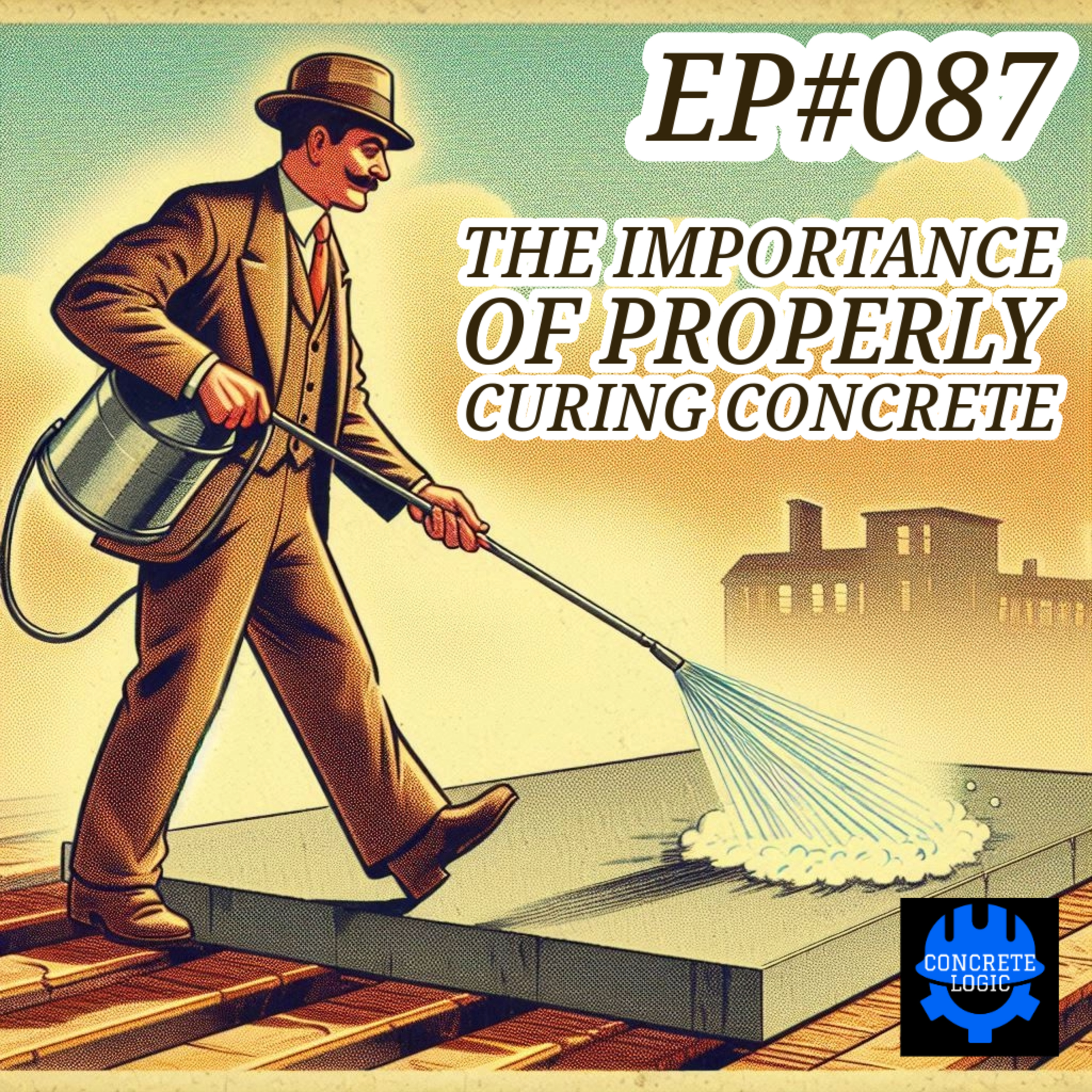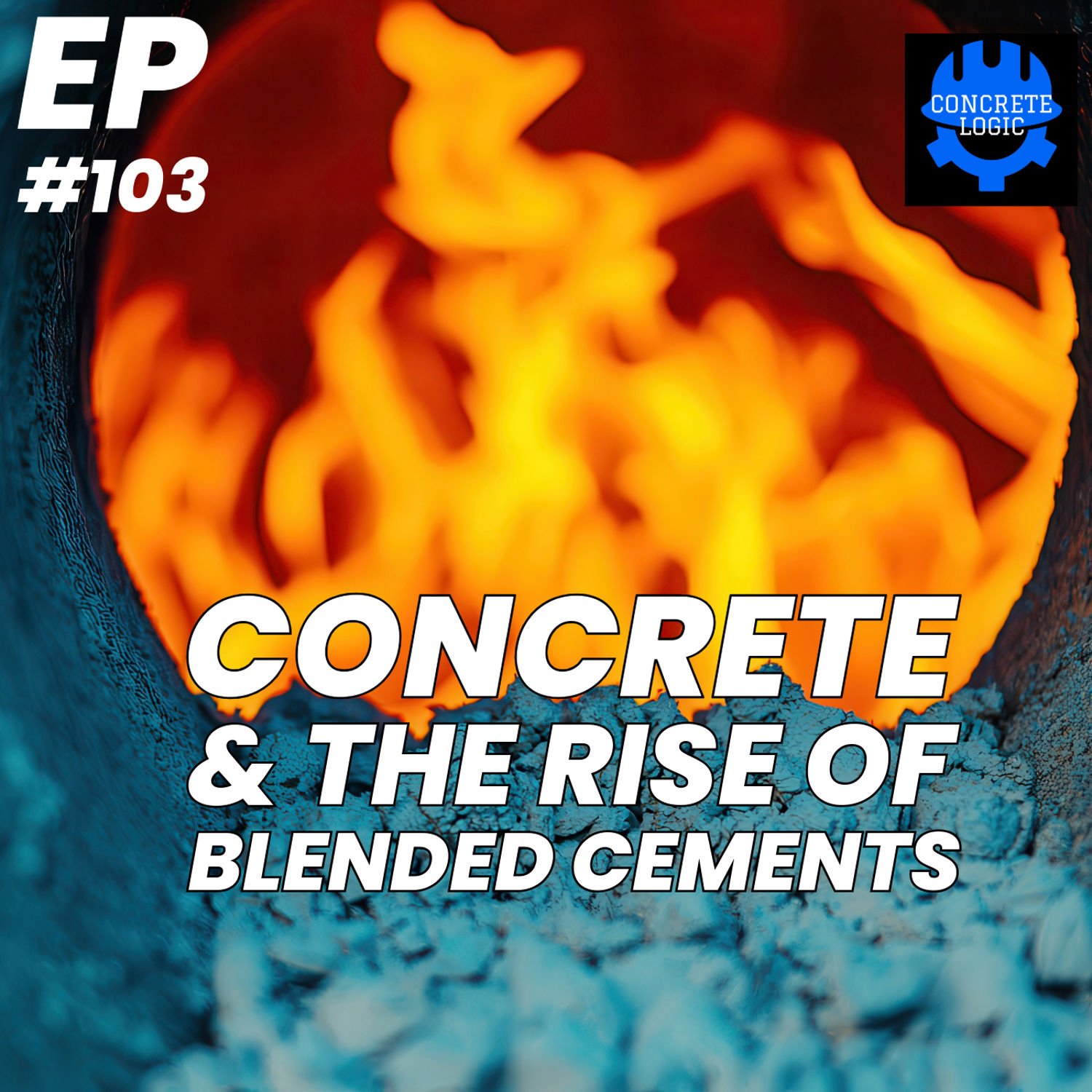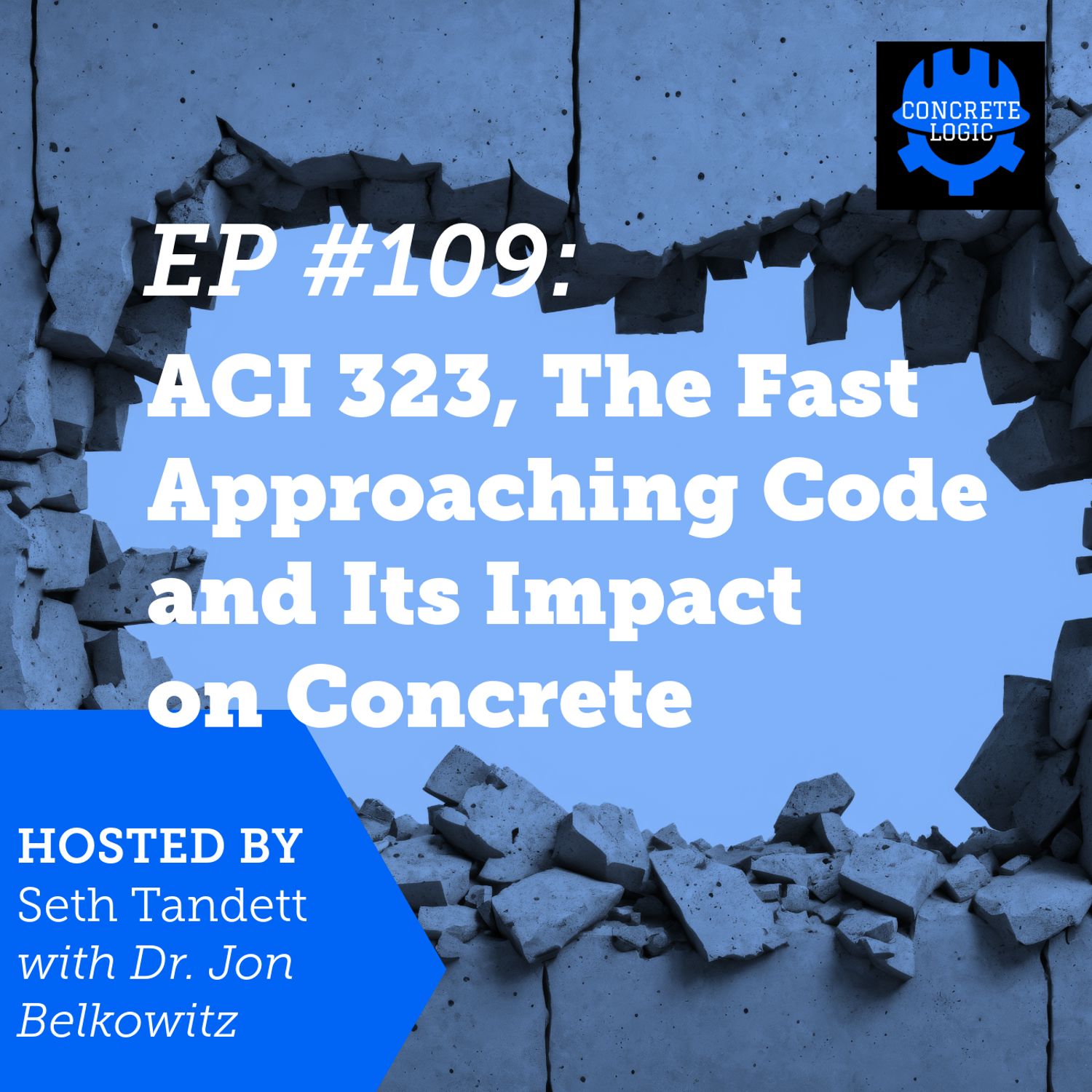EP #102: Testing Cement: How to Ensure Quality in the Concrete Industry
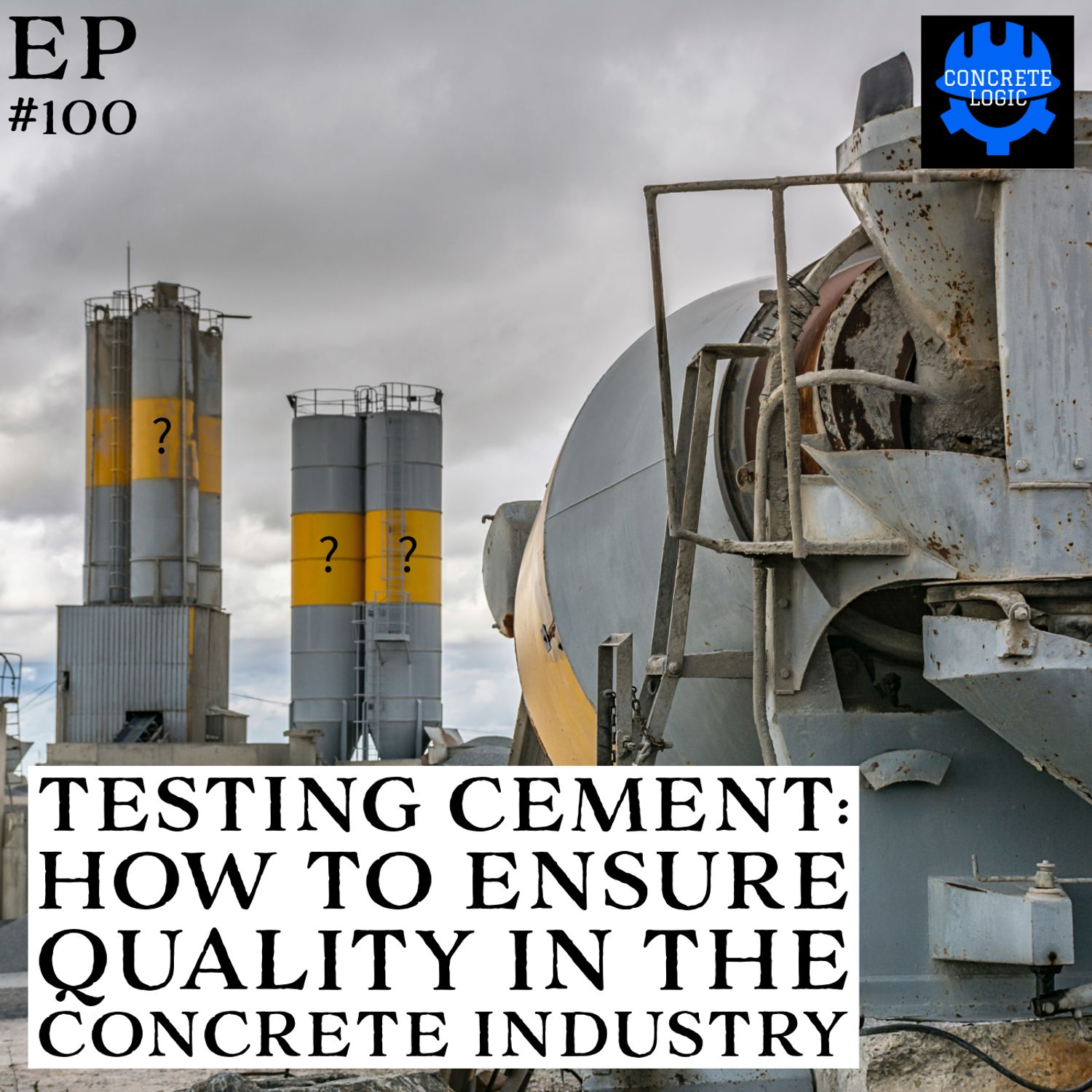
In this episode of the Concrete Logic Podcast, Seth and Dr. Jon Belkowitz delve into the complexities of cement testing, particularly focusing on Type 1L cement and the challenges posed by blended cements. They discuss the importance of establishing a proactive quality management system to ensure the integrity of concrete mixes, emphasizing the need for rigorous testing and quality control measures. The conversation highlights the financial implications of poor quality control and the potential for significant cost savings through proactive measures. Dr. Jon shares insights from his experiences in the industry, advocating for a shift towards more reliable testing practices to enhance the overall quality of concrete production.
Takeaways
- Quality management systems are essential for concrete producers.
- Type 1L cement is often misunderstood in the industry.
- Blended cements can lead to unexpected challenges.
- Proactive testing can prevent costly mistakes.
- Understanding ASTM standards is crucial for compliance.
- Quality control can significantly reduce legal liabilities.
- Investing in quality management can save money in the long run.
- Communication between teams is vital for quality assurance.
- Testing frequency should increase with new cement deliveries.
- The concrete industry must adapt to changing materials and standards.
Chapters
00:00 Introduction and Podcast Support
02:22 Donations and Guest Suggestions
08:35 Testing Cement: Ensuring Quality and Specifications
12:09 Understanding the Differences: Type 1L Cement vs. Type 1 Cement
19:58 The Need for a Quality Management System in the Concrete Industry
21:52 Implementing a Vetting Process for Cement: Benefits and Challenges
27:27 Testing Methods and Resources
36:17 The misconception of already doing quality control
41:33 The potential cost savings of proactive quality control
45:31 Avoiding issues by investing in proactive quality control
47:15 The simple steps to improve quality control
49:19 Conclusion and invitation to further discussion
***
Did you learn something from this episode? Would you like to support the concrete industry's favorite podcast? If so, donate at https://www.concretelogicpodcast.com/support/ . When YOU donate to the show, you will be listed as a producer of the next episode that is released!
***
Episode References
Guest: Dr. Jon Belkowitz | Intelligent Concrete | Jon@intelligent-concrete.com
Guest Website: https://www.intelligent-concrete.com/
Producers: Jodi Tandett
Donate & Become a Producer: https://www.concretelogicpodcast.com/support/
Music: Mike Dunton | https://www.mikeduntonmusic.com | mikeduntonmusic@gmail.com | Instagram @Mike_Dunton
Host: Seth Tandett, seth@concretelogicpodcast.com
Host LinkedIn: https://www.linkedin.com/in/seth-tandett/
Website: https://www.concretelogicpodcast.com/
LinkedIn: https://www.linkedin.com/company/concrete-logic-podcast
***
Elevate your concrete expertise and join a community of passionate professionals who drive industry innovation at the Concrete Logic Academy!
Learn more at https://www.concretelogicacademy.com/
***
Seth (00:01.92)
Welcome to another episode of the concrete logic podcast. And today I have a surprise guest. Just kidding. Dr. Belkowitz is back in the house. I asked him, so we've talked about, PLC or type one L cement a lot on the podcast. It's a favorite subject. And, we, I was curious about if we could test the cement that the
producers are getting ready, makes producers are getting to, ensure what they're ordering is what they're getting. So he's got an, he's got an answer for me, for us today. So we're gonna, we're going to talk about that. But first, as always, just a reminder to support the podcast or three things you can do for me. let's, if you get something out of the discussion today, which
Dr Jon (00:41.954)
That's a one.
Seth (00:59.586)
I mean, if you've been listening to the podcast for any amount of time and listen to Dr. John Belkowitz's, I don't know, had nine or 10 episodes in now. Any of them, you know, you're going to learn something today. So don't be selfish. Share the podcast with someone that is not currently listening, someone in the concrete industry, or even someone that's maybe interested in, in joining us in the industry.
Dr Jon (01:10.243)
Right.
Seth (01:27.754)
Second thing is, is if you go to ConcreteLogicPodcast .com, there are two ways to get ahold of me. One, there's a link at the top of the page. It says contact, click on that. You can shoot me an email. And we're looking for topic or guest suggestions. So I've had people do that in the last week. So I appreciate that. Thank you. Or if you're like me, I'm not, I'm not.
into writing as much as I am talking. Obviously I'm a host of a podcast. So if you'd like to leave voicemails, you can click on the microphone in the bottom right hand corner of the homepage. And it's like I said, it records your voice so you can talk right through your computer. And again, give me a suggestion on a topic or a guest or just want to say, give me some feedback or anything. So it's always good to hear from who's listening to the show. Appreciate that.
And then the last way is, donations. So if you want to donate to the show, click on the donate button that's in the upper right -hand corner of the homepage, again, concrete logic podcast .com. And you can give any amount and any amount is appreciated. So don't, don't, don't think it's gotta be some huge amount, but if you want to give a huge amount, that's, that's great as well. with that Dr. John.
Dr Jon (02:52.076)
Okay, I got four things. Donate, stop being cheap, right? Especially like, I was talking to Dan this morning and I interrupted him as he was listening to the Concrete Maturity podcast.
Seth (02:52.3)
we, okay.
Seth (03:05.354)
I think it's funny that you said, speaking of cheap, and then you went to Dan McCoy.
Ha ha ha ha ha.
Seth (03:17.314)
All right, sorry to,
Dr Jon (03:17.41)
Thank you for pointing that out. Not sorry. Not sorry, Dan. Dan was, mean, the amount of information he got just from that portion of the maturity podcast that we did was wild. The other thing is I think you should have on the following people, Joe Shetterly or Mike Nelson.
One is from E5, the other one is from Indiana DOT, and about the work with Liquid Flyash and the 275 bridges that they've done, and I might be misquoting numbers and I apologize that they've done without Flyash and they're using E5 nano silica in lieu of Flyash. The second thing is, and I keep saying this, I sound like a broken record and I apologize,
Somebody else out there in the audience needs to talk to Colin Lobo. You need to have Colin Lobo on as a guest.
Seth (04:18.101)
He's Ari Book.
Dr Jon (04:20.248)
Grrrr really? Really really? Dang. I don't think he likes me.
Seth (04:21.472)
Yeah, he's booked. Really, really. He's Colin Lobo's booked. Tyler Lay's booked. then, yeah, Tyler Lay. Yeah. Yeah. I thought.
Dr Jon (04:28.62)
Yeah, Tyler Leahy told me about. No, Tyler was inevitable.
Tyler Lay should be a quarterly guest because if anybody is at the tip of the spear and can feel the heartbeat of the industry within the academic, looking at the political side of the industry and looking at the practical side, the P squared or the PP,
Seth (05:02.889)
Ew, I don't like that.
Dr Jon (05:04.664)
Tyler Lay is the guy that I think he should have a standing reservation once a quarter. Anyway, last person.
Seth (05:14.122)
He's, he's, he's, he's on the annual basis right now. so we got some work to do there. So he's got, he like to go through, like a booking agent now to get to Tyler Lay. Yeah. He's T yeah, he's, he's high class.
Dr Jon (05:23.04)
Yeah, there's nothing wrong with that. bless. His time is that valuable. Well, his time is that valuable. Colin Lobo, I would say is the same thing. Can I give you a list of questions to ask Colin Lobo?
Seth (05:37.45)
Yes, please email them to me so we can get into what we're talking about today.
Dr Jon (05:41.099)
Wicked, wicked, wicked. The last person who is absolutely brilliant, Larry Sutter.
Seth (05:50.518)
Larry's. I got a look. don't, we've been exchanging emails back and forth. I think he's going to follow up with me this fall. So he's a, he's a, he's a, he's another tough guy. He's, he's talk. I guess he does a lot of talks and stuff, right?
Dr Jon (05:56.6)
Yeah.
Dr Jon (06:09.492)
He, it's not that he just does that. He also volunteers like a lot of his time. You want to talk about somebody who gives back to the industry? Like Larry should have told me to go F off years ago and never pick up a phone call from me ever again. Like he and I have gotten to so many yelling matches and every single one of them, he's teaching me something. Like I'm that type of student.
Seth (06:27.167)
-huh.
Dr Jon (06:35.694)
Like I don't like, that's nice. That's a really good idea. I'm like, nah, that doesn't make sense. Are you sure you know what you're doing? Like it. He's brilliant. He's a great mentor and he's helping change the industry. don't agree with everything he does all the time, but fuck he is C six 18 ASTM C six 18 is what he's in charge of. And I think that is something great to talk to him about. And that is affecting.
Class F, Class C, Class N ashes or pozzolanic material, whatever you want to call it, whatever they're called, coal combustion and naturally mined materials. He's the king of everything and Mano Shevitz is he doing a good job and he's our advisor for the colloidal silica AS team. I can't
Seth (07:26.134)
Gotcha. What's ASTM you mentioned for him? I'm sorry. I didn't write it.
Dr Jon (07:30.022)
I'm sorry, C, I speak so quickly, C618. It's the coffee, it's from Columbia.
Seth (07:35.554)
Okay. Gotcha. Nice. Like a good Colombian coffee. All right. So, the reason why I reached out to Dr. John about this is I had a, someone reach out to me, through the, through the podcast, through the website and what was going on was, this, this company was buying cement and they thought they were buying type one, two cement and there was type one L cement in the bags.
Dr Jon (07:40.361)
Heheheheh!
Seth (08:06.11)
And he found that out the hard way. So I was curious. no, that was a one. man, the dad jokes are thick today. so I was curious if there was a way for someone that is in that situation, that is getting bagged cement or cement that's thrown right into a silo, right? The truck pulls up and goes right into the silo.
Dr Jon (08:10.695)
Ooh! No pun intended! Huh? Huh?
Dr Jon (08:17.548)
three times today.
Seth (08:35.082)
How can you test the cement that you're receiving and making, make sure you're, you're getting what you're ordering.
Dr Jon (08:42.574)
Okay, is it my turn?
Seth (08:45.217)
Yes, go.
Dr Jon (08:48.302)
Can we look up the definition of the type 1L cement or just ASTMC 595 real quick? You know, all of us keep saying this incorrectly. We're calling it like a type 1L cement or we're calling it a limestone cement. And that's not the correct term. This is a blended hydraulic cement, right?
Seth (09:13.73)
landed.
Yeah, I just read that in a spec yesterday.
Dr Jon (09:20.978)
And when you get the milsert and we just hired CTL Skokie to do a milsert for us, God bless them. They're a wonderful company too. That's another, I can't remember his name, but that's another company you should talk to or a representative of some CTL group. They do a lot of testing all over the U S for concrete, as well as the raw materials and to talk to them about the changes. gosh. But anyway,
The assumption is that the material that we're getting is being diluted by a certain amount of limestone and that's causing issues. And that is the incorrect interpretation of the standard. Now, I didn't write this standard and I am writing a standard. I know that colloidal silica for use in concrete standard like I know my dissertation.
I know it back and forth, upside down, where I made the mistakes, what has to be fixed and what are gems. So I do not want to speak as if I wrote this standard. I want to speak as if I read this standard and is if I'm getting the mill reports from the certified testing companies, third party, and what that information is. And I can tell you, what we are getting is, little to no information.
The fact that they're telling us that there's a certain amount of calcium carbonate in there does not tell us what else is in the concrete or sorry, the cement. How it affects the concrete, I apologize, I sometimes jump sentences, is very important. Now, the vetting process I'm going to discuss, I wrote an abstract for it. I really want you to push back on me. Do you mind if I read this abstract, Seth?
Seth (10:55.658)
Mm -hmm. Submit. Yep.
Seth (11:15.586)
Go for it.
Dr Jon (11:16.814)
The concrete industry is facing a major challenge with conversion from ASTC 150 prescribed cements to where they told you the physical and chemical characteristics to the ASTM C 595 blended cements, which for most happened overnight. This transformation has brought unexpected consequences for producers, contractors, distributors,
in a variety of construction markets and says that's what you were alluding to when you were talking about, you know, this project. If not properly managed, it can lead to plastic shrinkage tracks, cracks, thermal cracks, weak surfaces, loss of compressive strength, or something as even as simple as change in color of the concrete.
all going squarely against the quality standards consumers have come to expect in their building and manufacturing processes. During our coffee talk, we're going to dive into what's really going on with the Type 1L conversion so that engineers, contractors, and concrete producers can confidently respond to changes in the industry landscape more effectively. Now,
What's your pushback immediately?
Seth (12:45.986)
I mean, nothing jumped out at me. think that's a fair assessment. I would just, I think the biggest thing there is, understanding that the type one L doesn't go, it doesn't fit under the C one 50. And you have to refer to the C five 95 because of that, that was, that was the.
The point that this person that reached out to me about the bag cement, what the type 1L does not qualify as an ASTMC 150 cement. I don't think this person knows about the C595. Well, maybe they do, they're, yeah.
Dr Jon (13:20.301)
Okay.
Dr Jon (13:35.938)
When you buy a C -150 cement, which is a prescriptive -based cement, it's, know, what's the title? Some it's not what the title is, John. They hand you a mail report, and that mail report, you can ask for that, you know, it's specification for Portland cement. And it's, you know, six types of cement, type one, type two, the type three, type four, type five, and the in -betweens. There was even talk.
of a type 6 at one time designed by Dick Burroughs, but what they're giving you is a prescription. They're telling you what's in the cement, so you have an idea of what's going on here, or then they came up with an 1157 cement, which was a performance -based cement. And that's when they started introducing the limestones. And they didn't really have to tell you what was in the cement, but they just had to tell you what the performance was. Now, it's the same thing, but they have to tell you less. It's tricalcium, dicalcium silicate, calcium carbonate, and the performance.
And that's it. And we're going to tell you anything else, the strength activity index, nothing else. There's no chemistry involved. Now that poses a lot of problems for people because, and Mano Shevitz, you know, I got to use Pareto's law in this part of the conversation. The reason why we give a shit about this is not because of the 80 % of the workhorse that goes out there, right? 80 % of the concrete that goes out there is residential concrete.
It's low cement, low admixtures, a lot of water, lot of rock and sand. It needs to hit 3 ,000 to 3 ,500 PSI in 7 to 28 days. That's not hard to do, even if you have to add a lot of cement, which folks are having to do right now. The problem comes from the 20 % of the concrete mixes that go out the door that are the specialty concrete mixes that have anywhere between three and six chemical admixtures in there. And the reality is...
That 20%, the higher end mixes, cause 80 % of our problems when it comes to producing and selling concrete. What's the problem? Looks like you're smelling something bad.
Seth (15:44.975)
just looking up the history of C595 versus C.
Dr Jon (15:48.994)
Don't stop, stop, stop. It's gonna break your heart. Like, how did we get here, dude? How did we get here?
Seth (15:55.298)
I didn't realize it's been around so long.
Dr Jon (15:59.054)
Well, the 1157s have been around long and the whole proponents, all these assholes, excuse my language, talking about the C595s, they refer to Colorado. Colorado has been using limestone based cements for years. It's been on the docket since like 2011. Colorado's, yeah. Colorado has had, just because you have something on the APL doesn't mean that people are using it. And I am.
Seth (16:15.072)
Well, get here. Does they say that about Europe?
Dr Jon (16:26.83)
I'm very thankful that I was making Colorado since 2005 up until now. So I know the Colorado industry. I know people who make and sell cement. There are five cement producers or five cements available in Colorado. It's one of the weirdest places in the world that you have so many fucking choices. Excuse my language. But the reality is when that 1157 came out, nobody wanted it. People are like, wait, wait, so you're diluting my cement and you want me to pay more for this?
Like I don't care about the environment. What did Rich say she said, tell us there's three things that he sells on the job site. Not one of them is environmentally friendly and what's good for the, for the, the world, the, the GWP, you know, I sell speed, I sell speed and I sell how fast can you get me off the job site or how cheap you can make it, right? How fast, how fast and how cheap can you make it? Right. That's what he sells. and rich, I'm sorry if I screwed that up.
Okay. So that was my abstract and my proposal is this. My point was that concrete producers, I don't care your style, wet batch or central platch, dry batch, volumetric, precast, you know, in bags that go into vertical mixers. If you're mixing and making cement composites, concrete to meet cement pastes,
you're being affected by this and you're selling product, you're being affected by this. And what I am saying, and this is where Dan pushed back is, we need to create a quality management system. Internally, if you're making concrete, you need to test out your materials. These blended cements, some of them have three to six admixtures in the cement. It has a water reducer, it has a calcium chromate, a calcium chloride.
It has a hydration stabilizer, it has a shrinkage compensating agent. It has a blah, blah, blah. you know, there's just so many bells and whistles and shit. They're allowed Aaron training agents. Now you add that to a concrete that has three to six chemicals and you have no pun intended a recipe for a disaster. again, John, we don't need to do this for residential concrete. Maybe not. Maybe you don't, but for high rise concrete for concrete that needs to be pumped.
Dr Jon (18:53.24)
for concrete that needs to be paved? Shit, you need to do something. Because that stuff is expensive to fricking rip out and replace. So.
Seth (18:56.95)
Mm
Seth (19:00.768)
Yeah.
Dr Jon (19:05.336)
What I'm suggesting, and just hear me out before you start throwing shit at me, okay? I'm suggesting that people who make concrete start doing a vetting process. And that means every time they get cement in, and I feel like you're you're like, reared up to throw something at me. Right? You're like in a pitching stance right now. It's kind of scary, right?
Hold on a second, what did you just text me? I'm suggesting that we start including a quality control management system that includes testing the fresh and hardened properties of the cement in combination with the admixtures we intend to use in our concrete. And that means work. That means setting up eight mixes.
Seth (19:55.383)
Yeah.
Dr Jon (19:58.766)
and I don't need a long time. I'm not asking for seven and 28 days. John, it's gonna take a long time.
Dr Jon (20:07.638)
You know.
The that I'm suggesting includes a mortar mixer, concrete testing machine, a Vicat apparatus, the temperature testing device, a flow table, some type of mini slump cone or from the flow table, a graduated flask for the mortar stick, sieves, ovens, and the thermostatically controlled box for your temperature versus time.
And then I'll stop here for the overnight tests. And I really only need 12 hours. need an overnight. I can do somewhere around eight tests in a 24 -hour period. And with that, I can get semi -etabatic temperatures, strength activity index, mortar flow, foam index, number 16 sieve analysis, autogenous shrinkage, and I can do a cracking test too.
Seth (21:16.194)
All within 24 hours. Okay.
Dr Jon (21:23.96)
Testing frequency every time you get a new cement in, every time you get a new cement in. needs to be all new cement from now on needs to be blown into silos at night. And these people will be working in a conference room until a QC shack can be built. And you can buy a tiny home and convert that into a QC shack. But yeah, all...
Seth (21:49.356)
Mm -hmm.
Dr Jon (21:52.814)
The top 20, all of them will be tested to determine if they fit within a temperature versus time, strength, activity, cracking, all have to be indexed.
Dr Jon (22:08.878)
Yeah, I can go into how much all that'll cost by the way too if you want that but it's really, it's going to cost money, means we have to hire people. What Dan pushed out is no way that's gonna happen. I know you're going to too because we're talking hundreds and thousands of dollars. Like maybe 120 ,000 to set up a QC shack, train somebody, pay somebody and set up this system.
Seth (22:38.092)
These can't be the same people that are doing quality control now.
Dr Jon (22:38.478)
Go ahead, I'm ready.
No. No, they got their own shit to do. Yeah, they got their own shit to do. We can't give them another task. That's not nice.
Seth (22:43.712)
No? Okay.
Dr Jon (22:52.982)
If they want to apply for the job, God bless, but I need my people in the field.
Seth (22:58.208)
Right. But there's some quality control folks that are already in the ready mix, supplier team.
Dr Jon (23:06.018)
Yeah, so they can apply for the job, but you can't objectively base these people. You can't ask them to work. Yeah. They need to talk to each other and they need to communicate about what the hell is going on. I'll give you for instance, right? Dan's like, that's bullshit. You can't do that in every mix. What you gonna change the mix, John? You can't change the mix, you need a whole new submittal. Yeah, I'm improvising Dan here and I think I did a good job.
Seth (23:11.02)
you're saying these are two separate groups so you can't have a gotcha all right yeah
Dr Jon (23:35.788)
Dan's argument is that this cannot be used to change the mixes on the fly. It's a broken system if that's what you're using it for. And it's not. It's not. And that's where I cut Dan off, like, hey man, you're understanding it the wrong way. I have a mustache hair that's tickling my nose. This is used as a binary system, pass, fail. We, years ago, created a mix called Cronolia Road Patch. Fucking amazing.
David Neighbor, Mr. McCombs, and Mr. Subcheck and I created this mix. And it was the talk of the town, man. Two hours of slump retention and two hours later you can open it up to traffic. It's fucking beautiful. It was beautiful. But it used, and it didn't crack, it no plastic, no drying shrinkage cracks, it didn't die out at 28 days, it got like 11 ,000 at 28 days, fucking amazing mix.
Seth (24:18.913)
Wow.
Dr Jon (24:34.294)
And to do all that, it had seven different admixtures in it. Seven different admixtures, John? Well, yeah, you're making it do amazing things. You need to mess with the chemistry.
Seth (24:44.768)
Yeah.
Dr Jon (24:46.314)
And we knew, Kevin and I knew, Mr. Subject and I knew, that if we did the temperature curves, there was a certain temperature time ratio that we had to get. There was a certain time that if we didn't reach the temperature, we knew we weren't going to make strength. It was called the Belso Ratio. Right? It was our quick way of checking.
You know, with maturity, not that I want to get into that discussion again, but you can associate maturity to compressive strength, flexural strength, shrinkage, setting time, whatever. You should have to create the indices, right? Same thing here. So Kevin and I created these quick tests and it all came from, there was a time that we were creating this mix. We were selling it throughout Colorado in the Western US business unit. And all of a sudden we had a bean counter who was our VP GM. And he decided one day that we were going to
Seth (25:17.93)
Right. Yep.
Dr Jon (25:37.262)
Take the cement out of all the silos and replace it with another company cement because he was saving $20 per ton. God bless him, it's a brilliant idea. Little did we know we were saving that much money on cement because they totally changed where the SO3 content came from. While it didn't mess with the residential mixes, every single one of our job sites that had this Cronolia, which was three times the cost of a residential mix, concrete fell asleep.
Seth (26:03.84)
-huh.
Dr Jon (26:07.406)
Didn't set up in four hours, didn't set up in eight hours, right? Took 24 hours for it to set up and CDOT wants its money when you do that. It took them weeks. The cement company, doesn't matter who they are, took them weeks to come back and say, hey, it was our fault. We were getting our gypsum from a different source to change it up to the SO3 content. We're a bunch of jerks. We're really sorry. The entire time.
We thought it was our fault. The customer put it on us. They went to the competitor. We had to work to get them back. There was no accountability responsibility. So what we had to do was create this method. That's why I have this method. That's why this mini slump cone looks like it's been used a lot. Right? Same thing with this guy, but not this guy. I clean this mother effer out all the time. Look how beautiful that is. This is an air pressure meter for mortars.
Seth (27:00.108)
What is that?
Seth (27:04.818)
Okay.
Dr Jon (27:05.576)
You can't get air on mortars, Bullshit you can't from Humble. And I this half price because I bought it off the table at the show. Plus...
Seth (27:16.172)
I remember you posting about that. That's probably the only way Whitney let you buy that because it was half off.
Dr Jon (27:22.904)
So.
Dr Jon (27:27.288)
So, you know, there are ways to do these tests in a quick period of time and they're not from making them up. And gosh, I told this to Daniel this morning, I was like, buy the ASTM for concrete and cement and just look through it. You'll find that there are the most wacky, tobacco tests you've ever... There's a test where you take a concrete cylinder. It's not tall enough. Concrete cylinder, it's not tall enough.
And you put a flashlight behind it and you compare it to other mixes to say how much that concrete is shrunk. And it's for specifically for high early strength concrete. And all you're doing is taking a cylinder and point a flashlight and measuring the change of the shadow. Like there's so many amazing tests that are validated and they're at our disposal that can be used. There's an autogenous shrinkage test, it's a 24 hour test.
And it specifically looks at the cement paste and anybody can do it. It doesn't matter where I used to do it on my mom and dad's dining room table. I've gotten a lot of trouble for doing that. Mom got pissed. Harry, I can't. You talk to your son, Harry. I can't. He's got concrete samples on my dining room table. My mom still has plastic. You know how they used to do that back in the day? She has that on her dining room table. So I've gone through two, four, six.
Seth (28:34.7)
Like, imagine.
Seth (28:46.54)
Yeah.
Dr Jon (28:53.07)
Eight tests that it's going to cost a company plus a new person 120 ,000 to do.
What's your biggest pushback and why?
Seth (29:08.322)
Well, people are, will be reluctant to do that since they haven't needed to do it so far. Right. So why are we spending, well, you said 120 at a minimum just to get it off the ground. That's not. Yeah.
Dr Jon (29:19.438)
At a minimum. Wait. Yeah. 15, 20 ,000 for the QC shack and some of the equipment. You know, the person, you know, was that 70 to 90 ,000 and then the time invested in training them. So just figure 120 ,000, you know?
Seth (29:35.456)
Yeah.
Seth (29:39.318)
And then the next, like you've already talked about, they don't think they have the time to do it, right?
Dr Jon (29:48.193)
Right.
Seth (29:51.126)
but then the flip side would be, are we avoiding?
Dr Jon (29:56.734)
whoa. So we had a good friend of ours who batched concrete for a living. This is when we're still in Colorado. We're a young company. This was about 2014, 2015. Called me up crying. And this guy doesn't cry. He's like tough as nails. He reminds me of Kojak. You know, who loves you, baby? He said, I can't get insurance. I said, what?
He you can get insurance. He goes, can, but it's too expensive. I go, well, what's the problem? He goes, well, we get sued every other week or was twice a week, whatever it was. He's like, we just, they had no way of knowing if what was going out the door was cotton candy or concrete.
Dr Jon (30:47.886)
And because of that, when concrete wouldn't make strength, it wasn't the 3500 PSI, it was the 20 % of the concrete, higher performance stuff. Any one of them went bad, he was looking at 50 to $150 ,000 payout. John, he has insurance. When you get sued that many times, the premium don't count no more. It don't work that way. Right? So I took him out for breakfast.
Seth (31:13.353)
Right.
Dr Jon (31:17.868)
He said, I need your help. So I thought about it, took him out for breakfast the next day, Rosie's diner. said, I'm investing in you. Breakfast is on me this morning. I said, but you got two or three more lawsuits and then you're going under. You're relying on your contractor to do quality control for you. Every raw material and the concrete he made, he had to get technical or he had to get the data sheets from his contractor. And that's how he did quality control.
Now you're saying to yourself, that's bullshit. You can't do that. Well, yeah, that's why he almost lost his business. Right? It took us a year to set up a quality control system for him to the point where it paid for itself just by the amount of lawsuits he wasn't getting. In a year's timeframe, he stopped getting lawsuits because of quality control issues. There's always lawsuits. There's always a contractor who's an asshole, but it went from two to four lawsuits a month to one to two lawsuits a year.
which means a lot for a family -owned business, sometimes which are personally insured.
Seth (32:22.613)
Right.
Dr Jon (32:28.462)
Sorry, to check my tamping rods. Five years later, he was able to sell the company for 40 million.
Seth (32:38.636)
Well.
Dr Jon (32:39.158)
Now, what are we trying to capture? Man, nobody minds sending out bad concrete. They just don't want to have to deal with the implications from sending bad concrete. And years ago, I don't want to make it sound like, we had no problems before type 1L concrete was just transportation. It's not true. We had problems.
But there were problems that we could digest. were problems that we could deal with. There were manifold of issues that we were dealing with day to day. Now what we've done is some of these jerks from universities who've been elevated in the ASTM. So you know who I'm talking about, right? They're the ones who are saying, why does it matter that you have to calculate water cement ratio? Why does it matter that we need to know what's in the cement? We are a performant.
Seth (33:19.831)
Mm -hmm.
Dr Jon (33:34.103)
performance -based industry. We make concrete perform a certain way based on the prescription of the materials. You take that prescription away, you hand us a hodgepodge.
Dr Jon (33:50.31)
I got to do something to make sure. So I'm not going to convince anybody to use any of these tests. And again, as Dan said, you can't use these tests to do on the fly mix design changes. But like we did with the Cronolia Road Patch, when the cement changed and because we were using a Tom Cruise cocktail and dreams mix, we wouldn't send trucks out. Like,
F you. We're not doing this job site. We're not placing concrete and then hoping and praying that it sets up. I'd rather lose the job site and let them go to the competitor. I gotta figure this shit out. And A, you can't change the mix. You can change ad mixtures. Ready mix providers know what I'm talking about. Your percent change.
Seth (34:29.089)
Mm -hmm.
Seth (34:34.882)
Right.
Dr Jon (34:43.502)
Rich will tell you this. Yeah, yeah, there's things you could change on the admixture. You could throw extra admixture. can't change the cement and the water content, sand and rock. Yeah, yeah, you can change the chemistry though. And with these tests, yeah, you can make decisions. Once you have a lot of experience, you can make, with that 12 hour bandwidth, you can make decisions on admixtures if it's, I just got to push it back into the band just a little bit. Right? But if you know there's a major swing, like it falls asleep,
Seth (35:05.985)
Right.
Dr Jon (35:11.542)
Or it sets up like a bat out of hell where you won't be able to make it out of the plant with the truck.
Seth (35:15.979)
Yeah.
Dr Jon (35:17.646)
and you can do eight mixes in a 12 hour period, convince me why you shouldn't do it. Who's the money? Well, people aren't smart enough. Not enough the time. You have time to get sued? You have time to rip out and replace concrete?
Seth (35:36.074)
Right now they're testing it on the fly. Right? Yeah, sure they are. They're ready to make suppliers.
Dr Jon (35:40.664)
They're not. No, they're getting, who's testing it on the fly? No, no, they're doing reactive testing. They're not doing any type of proactive testing.
Seth (35:51.882)
No, I will give you that. It's not proactive. What you're talking about is proactive. It's reactive. It's deliver it to the site. Wait for the contractor to scream at you. then adjust it. Yeah.
Dr Jon (35:54.84)
But it's not on the fly.
Dr Jon (36:02.424)
For what? add some water.
Dr Jon (36:08.449)
At that point, you're too late.
Seth (36:10.676)
Right. No, I agree. Yeah. So that's, that would be the other pushback, right? We're already doing that. Dr. John.
Dr Jon (36:17.678)
No, you're No, you're not. You're not doing it. If you want to lie to yourself and tell yourself you're doing it, what? You're doing a temperature versus time chart. You're doing foam index. You're doing 24 hour strengths. You're doing a cracking test. You're doing autogenous strength test. Easy tests where you can get the materials, most of them from fucking Walmart or from Fisher Scientific, from Uncle Jeff and the Amazonians. You're not doing that. And they're easy tests where you really have zero excuse.
Dr Jon (36:49.624)
I'm trying to think of a good example.
Seth (36:52.64)
Is there, is there anyone, any of these, some, ready mix producers that you work, work with that, you know, of that is doing something like this? Maybe not to the extent. Yes. To the extent. Yeah.
Dr Jon (37:03.214)
to the extent, shoot, yet don't forget, I know Dr. John, but Dr. John used to be a fricking lab tech who worked at a ready -mixed plant that I started out backing trucks up. And I went, I did it while I was there. This is what we had to do, and I was the asshole. Whitney will tell you, our first date was in a concrete laboratory. I almost broke up with Whitney for stopping a stopwatch. I used to sleep.
Seth (37:16.298)
Yeah. So you did it while you were there, this, what you're talking. Okay. Yeah.
Dr Jon (37:33.742)
In my office with the sleeping bag, I used to watch Antonio Banderas' Assassin movies because that's all freaking Kevin loved and he had a DVD, a remote DVD thing. And I would wake up and do time assets, wake up and do breaks, download stuff to the Addiacal system, which is temperature versus time. They don't make them anymore, but it's a styrofoam box with thermocouples and a data acquisition system. costs 1500 bucks, 1200 bucks to make.
Seth (38:02.594)
so it can be done. You're not asking for something that can't be done.
Dr Jon (38:06.318)
It's again, what did Dan say? you can't teach a fourth grader how to dunk on a 10 foot rim. No, but this is not the type of game we're talking about. Here we're talking about survival of companies. And if you take 20 fourth graders, put them in the Amazon rainforest, a percent will survive because they learned how to adapt. I don't have to convince anybody.
It's either they want to adapt and they want to make themselves stronger or they're going to be weaker, they're going to fall apart, the company is going to go bankrupt from the lawsuits and they'll have to change their name if they can.
And that's just the name of the game.
Seth (38:49.984)
Yeah. So you're avoiding, disasters down the road, but also too, it couldn't you be, it's your potential of, saving some money. So you test it and make it money because you're testing, you would test the cement and then you could adjust your, your, your mix design based on the properties of the cement that you actually have on hand. Right. You could.
Dr Jon (39:01.857)
and making money.
Dr Jon (39:13.804)
Yeah, with your admins. you become good enough, this is not a one -time deal. This is somebody who is on your team. You know, even race car drivers do that. Well, John, we're not in the race car driving industry. Are we? Do we have the same specifications and limitations, the fuel needs, the...
Seth (39:19.34)
Yeah.
Seth (39:23.819)
Yeah.
Dr Jon (39:36.898)
Didn't even say hi to Seth. Hi Seth, I don't want to interrupt you. You never interrupt me, baby. I love you. I love you too. Yeah. Any high performance industry that is reliant on, mean, shit, cement is almost, is the most important part of the mix. Right? It's not the water, you add water to rock, nothing happens to your rock and sand.
When you add the wrong amount of chemicals and water to your cement, shit goes downhill in a handbasket. I don't understand that saying. I'm not going to use that again. But these tests, once you get enough of them and you set them up to review as a team, I remember McCombs, Kevin, and the batch operators and I would look at the data and be like, shit, look at that. No wonder why we had a fucking problem.
Seth (40:10.156)
you
Yeah, it does it.
Dr Jon (40:34.968)
Like they were seeing, they were seeing the trends out of the data that we were. It doesn't take long for people to start noticing trends. If you have a good quality control program on the raw material side and making decisions based off of it. Like, don't send out the trucks. Stop, stop, stop. We've seen this before, man. Don't do it. I'm so glad we did this. Whew. Let's spend the morning getting some Mexican food and coffee and figure out how to get.
Seth (40:39.611)
-huh.
Seth (40:55.893)
Yeah.
Yeah
Dr Jon (41:04.514)
Yeah, you guys can send out all the residential mix you want to. Send it out, it won't affect it, but this high early strength shit...
Seth (41:14.007)
Yep.
Dr Jon (41:14.038)
I to say just that by itself is a Christmas contract. Imagine having seven plants, they all have a specialty mix, and all of them are sending out five trucks that morning.
Seth (41:27.2)
huh. Yeah. It's a of money.
Dr Jon (41:28.726)
Right? Whew!
Dr Jon (41:33.27)
In Hebrew, you say, ze abekesiv.
Seth (41:39.734)
Okay.
Dr Jon (41:39.766)
And the response to that is, ze amonkesev!
Seth (41:45.377)
You lost me.
Dr Jon (41:46.722)
That just means, wow, it is a lot of money.
Seth (41:50.412)
Ha ha ha.
Dr Jon (41:50.776)
So, you know, what would be nice? And I think, you know, a suggestion for the next type of podcast, you need to evolve the podcast. It can't just be inviting people to come and talk. It's like what good editors do for good magazines. Did ever read, I think it was Concrete Producer, the editor was Bill Palmer.
Seth (42:19.98)
I don't believe so, no.
Dr Jon (42:22.51)
It's a defunct magazine. I think they might have an online platform, but ever since Bill left, I don't like the new editor. I used to publish articles for Bill. He was the first person to ever giving me the ability to publish in a magazine and not a technical journal, which is a huge thing for a writer like me. Like he gave me my first like real publishing gig and the next 15 or 20 I did. Bill was very, very good to me.
Seth (42:38.774)
Mm
Dr Jon (42:53.326)
Bill's biggest thing was he brought the part one and part two to the industry. I mean, I don't know if you ever read Ken Hovers, Why Is There Air and Concrete part one, part two, but the part one, part two all came from Bill Palmer. I'm making a harsh claim that anybody who produces concrete can't rely on the cement producers to give them the information that they need to make
Seth (43:02.226)
huh.
Dr Jon (43:22.936)
Forget quality concrete, let's say subpar concrete that doesn't get you a lawsuit, that they have to take it upon themselves. It would be nice if there was a part two where we can have a ready mix producer on board with me and you, where you're the construction guy, I'm the Dr. John guy, they're the producer, and they say, screw you, man. There's no way I can afford, you want me to, how, you made concrete. When was the last time you saw a ticket?
You ever seen a research budget item in my invoice? No, because I can't do that. I can't afford it. Like that's the first thing that you hear from the argument. We're not a lab, John. This is not a university, John. Okay. Well, your budget is how much were you sued last? Whatever your last lawsuit was, that's your new budget to create a QMS system.
Seth (44:14.144)
Yeah.
Dr Jon (44:15.202)
I think a part two with this with Rich who would yell at me, yeah, we make concrete, one, two, three, but.
Seth (44:26.134)
Yeah.
Dr Jon (44:26.967)
You're playing Russian roulette and you don't know if you have bullets with gun powder or bullets with cotton candy in them. It's not a good analogy.
Seth (44:37.418)
Yeah. Pew pew.
Seth (44:41.764)
We know what you mean. Yeah. Cause that, that, that, that's their responsibility. Right. And I think Rich would, Rich would admit that. I think he has.
Dr Jon (44:50.498)
Well, and then a lot of the discussion, and I need your validation on this or your vetting or verification is with these, what you had said before is I, the producer gets the cement, they make the concrete problems happen. And then if they get anything from the cement company, it's because they have proved that the cement company was at fault. And that is not an easy or inexpensive process.
Seth (45:18.839)
Yeah.
Dr Jon (45:19.756)
And that's the reactive process that you were talking about.
Seth (45:22.87)
Yes.
Dr Jon (45:24.608)
invest that money in a proactive process, which is...
Seth (45:27.35)
Yeah, much cheaper. It sounds like.
Dr Jon (45:31.372)
And you said it and I keep cutting you off and I'm so sorry. Whitney keeps telling me, let Seth talk. You're going to make money. How are you going to make money Seth?
Seth (45:39.787)
Yeah.
Seth (45:43.786)
I think if you know what you're putting in the, what the, properties of that cement that you're, you're using to me, my little bit of, of concrete chemistry knowledge would tell me that you would be able to make adjustments to what you think you have that could be less expensive, but also, like I said, you would make money avoiding potential issues down the road. So.
Dr Jon (45:50.304)
Thanks
Seth (46:11.69)
And I would think how much you can't put a value on less stress. Cause if, like you said, you're, if you're sending out concrete and you're rolling the dice that you think you think you did it, you think you got it. Right. But.
Dr Jon (46:12.184)
To me, that's...
Dr Jon (46:27.016)
It's the simple things that I think producers have forgotten about. My favorite lesson I ever learned from Mr. McCombs. You want to start saving a carbon footprint on your concrete? Have your salespeople call up and just make sure the form work is ready to go.
Seth (46:44.982)
Yep.
Dr Jon (46:46.86)
You just saved a few trucks right there, just from that day. Right? How many trucks have gotten there and the formwork is not ready to go? And we keep the cong... Don't worry, it'll be fine. Right? Doing this test? Look at this! Look at this test! Look at this test! They're pretty! Look how pretty these are! And look... Look at this test!
Seth (47:09.568)
Yeah. Yeah.
Dr Jon (47:15.534)
Come on, dude, this is awesome. Like all these tests are fun to do and I can get a test made, like batched up and tested in 35 minutes.
Seth (47:18.572)
Yeah.
Dr Jon (47:34.08)
Right now I gotta come back and look at the date. that takes a little while. I gotta break things, but...
Dr Jon (47:42.2)
You said that you were supposed to disagree with me the entire time. You're not supposed to say yes. You're supposed to push back. You did? Okay, my bad, sorry.
Seth (47:46.656)
No, I did push back, but I'm not going to do as good as say Rich would because he's in it.
Dr Jon (47:56.146)
Rich has a lot bigger budget and I think Rich is already doing something like this. It would be another version of tests. I think we need to get somebody on like Steve Crawford from Speedway where Steve is dealing with seven plants. He's the quality control manager.
Seth (48:20.332)
Yeah. And I got, I know some quality control guys that I think we'll put this out there and see what they say. And then I talk and talk, get somebody that hasn't been on the podcast yet to, to maybe punch you in the mouth a couple of times.
Dr Jon (48:34.476)
Yeah. And if you want to do that without me, I can expect them to push back. But you know, my father says it best. Look at the alternative. Like you've already been doing it the other way and it sucks. You said the stress. Imagine having a lot more confidence. Forget not having the stress. Go the flip side of it. Not just making money, but just like,
A, you know, we're just making concrete now. We're dealing with the problems we used to, but it's easier to make concrete.
Seth (49:12.768)
Yeah. Yeah, that's a good, I think that's a good, good way to end today show Dr. John. Thank you. I appreciate it once again. so, folks, like you said, please share this and we'll, we'll get somebody on here to give us the counter argument and folks until next time. what? Yep.
Dr Jon (49:19.425)
Yeah.
Dr Jon (49:33.442)
Hold on one second. Hold on a second. We're writing an article on this that we'll publish and we're starting to give talks on this. So if you want, and you don't have to hire us, you do have to pay for my sleep and arrangements and getting out there, but I can even do it virtual, but we're giving this for free. So if you want to do this in an association chapter, if you want to do it for your company.
Seth (49:42.865)
okay, cool.
Dr Jon (50:01.198)
We don't charge for this presentation, especially if you do it virtually. It's a one hour presentation, 45 minutes to 30 minute talk, and the rest of it is Q &A. So don't hesitate to reach out to us, y 'all.
Seth (50:16.662)
Yeah. So yeah, we'll put the link intelligent concrete. Right. That's what it's through. Yes.
Dr Jon (50:22.85)
Yeah, I'll give you a link for the article when it's done.
Seth (50:25.666)
Cool. All right. Thank you again. And folks, until next time, let's keep it concrete.
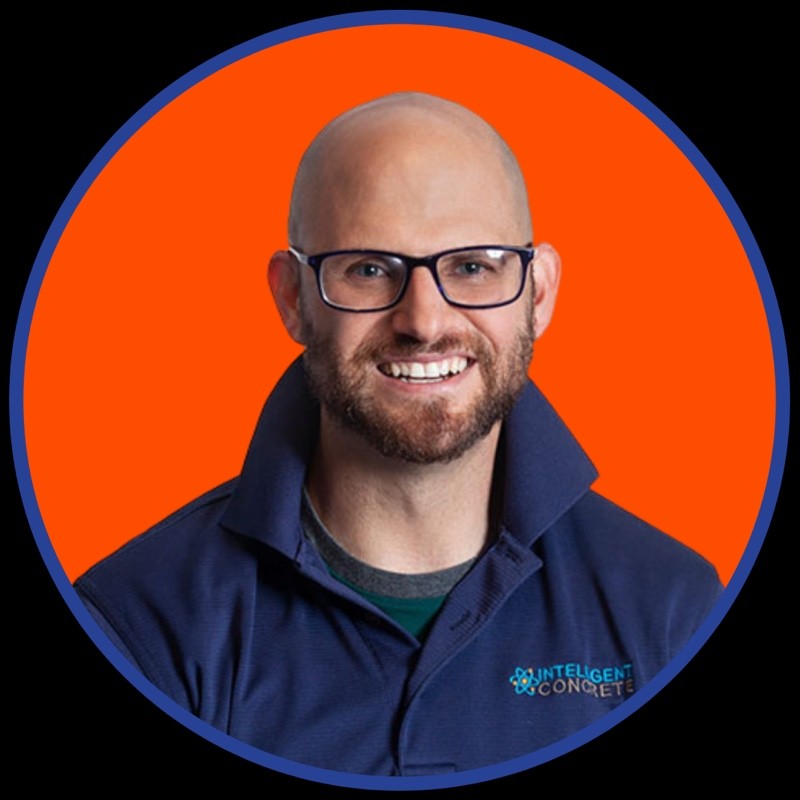
Dr. Jon Belkowitz
Jon Belkowitz is the CEO of EDYSTON, LLC and CTO at Intelligent Concrete, LLC. Before Intelligent Concrete, LLC, he served in the United States Air Force from 1996 to 2006 specializing in Civil Engineering. His tour of duty introduced Dr. Belkowitz to a wide variety of concrete types and uses which were dependent upon the engineering practices of different host nation forces, developing nations, and disaster repair initiatives. Jon has worked in private laboratories on structural engineering and materials development projects to include the application of nanotechnology in concrete. Dr. Belkowitz has worked as a consultant on projects in the United States, India, Turkey, Africa, Italy, New Zealand, Australia, and Germany. Jon has worked as Chief of Materials for a 3D concrete printing firm, an advisor for NASA on 3D printing of concrete holds patent applications on 3D printing with concrete, and is an ACI member on the subject. Jon received his Masters of Mat Science from the University of Denver and his Ph.D. in Mechanical Engineering with a specialty in Nanotechnology in Concrete at Stevens Institute of Technology in New Jersey. Jon is a licensed Professional Engineer in Colorado and Maryland.







